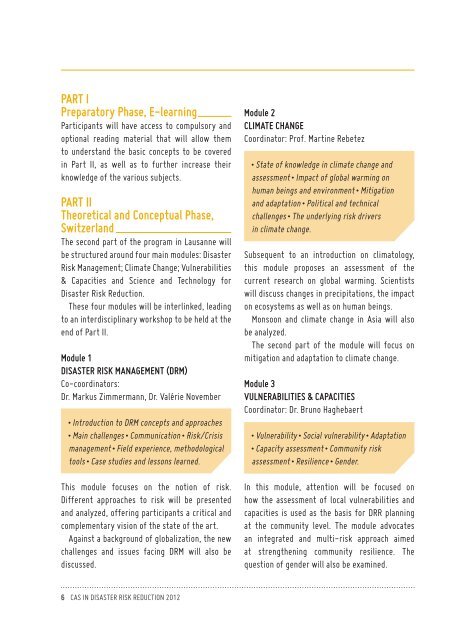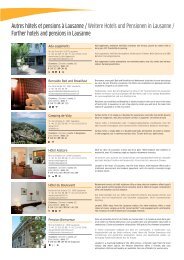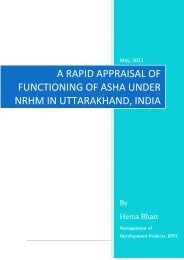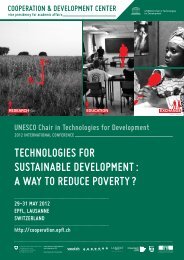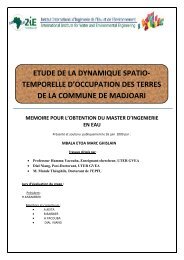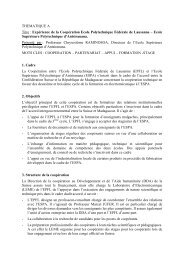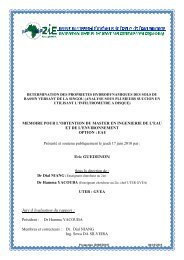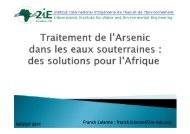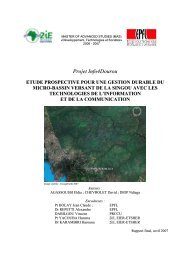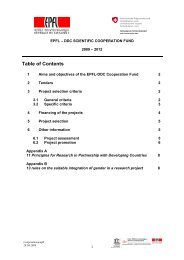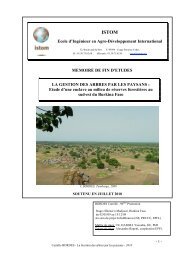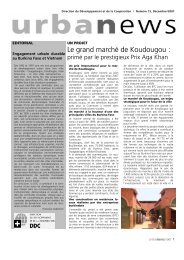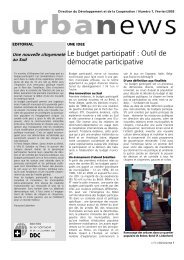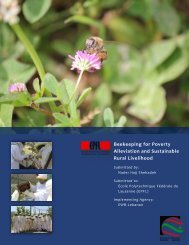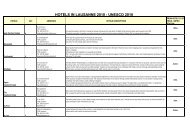CDRR 2012 Program Brochure.pdf - Cooperation at EPFL
CDRR 2012 Program Brochure.pdf - Cooperation at EPFL
CDRR 2012 Program Brochure.pdf - Cooperation at EPFL
Create successful ePaper yourself
Turn your PDF publications into a flip-book with our unique Google optimized e-Paper software.
PART I<br />
Prepar<strong>at</strong>ory Phase, E-learning<br />
Participants will have access to compulsory and<br />
optional reading m<strong>at</strong>erial th<strong>at</strong> will allow them<br />
to understand the basic concepts to be covered<br />
in Part II, as well as to further increase their<br />
knowledge of the various subjects.<br />
PART II<br />
Theoretical and Conceptual Phase,<br />
Switzerland<br />
The second part of the program in Lausanne will<br />
be structured around four main modules: Disaster<br />
Risk Management; Clim<strong>at</strong>e Change; Vulnerabilities<br />
& Capacities and Science and Technology for<br />
Disaster Risk Reduction.<br />
These four modules will be interlinked, leading<br />
to an interdisciplinary workshop to be held <strong>at</strong> the<br />
end of Part II.<br />
Module 1<br />
DisasTER Risk MANAGEMENT (DRM)<br />
Co-coordin<strong>at</strong>ors:<br />
Dr. Markus Zimmermann, Dr. Valérie November<br />
• Introduction to DRM concepts and approaches<br />
• Main challenges • Communic<strong>at</strong>ion • Risk/Crisis<br />
management • Field experience, methodological<br />
tools • Case studies and lessons learned.<br />
This module focuses on the notion of risk.<br />
Different approaches to risk will be presented<br />
and analyzed, offering participants a critical and<br />
complementary vision of the st<strong>at</strong>e of the art.<br />
Against a background of globaliz<strong>at</strong>ion, the new<br />
challenges and issues facing DRM will also be<br />
discussed.<br />
Module 2<br />
CLIMATE CHANGE<br />
Coordin<strong>at</strong>or: Prof. Martine Rebetez<br />
• St<strong>at</strong>e of knowledge in clim<strong>at</strong>e change and<br />
assessment • Impact of global warming on<br />
human beings and environment • Mitig<strong>at</strong>ion<br />
and adapt<strong>at</strong>ion • Political and technical<br />
challenges • The underlying risk drivers<br />
in clim<strong>at</strong>e change.<br />
Subsequent to an introduction on clim<strong>at</strong>ology,<br />
this module proposes an assessment of the<br />
current research on global warming. Scientists<br />
will discuss changes in precipit<strong>at</strong>ions, the impact<br />
on ecosystems as well as on human beings.<br />
Monsoon and clim<strong>at</strong>e change in Asia will also<br />
be analyzed.<br />
The second part of the module will focus on<br />
mitig<strong>at</strong>ion and adapt<strong>at</strong>ion to clim<strong>at</strong>e change.<br />
Module 3<br />
VuLNERABILITIEs & CAPACITIEs<br />
Coordin<strong>at</strong>or: Dr. Bruno Haghebaert<br />
• Vulnerability • Social vulnerability • Adapt<strong>at</strong>ion<br />
• Capacity assessment • Community risk<br />
assessment • Resilience • Gender.<br />
In this module, <strong>at</strong>tention will be focused on<br />
how the assessment of local vulnerabilities and<br />
capacities is used as the basis for DRR planning<br />
<strong>at</strong> the community level. The module advoc<strong>at</strong>es<br />
an integr<strong>at</strong>ed and multi-risk approach aimed<br />
<strong>at</strong> strengthening community resilience. The<br />
question of gender will also be examined.<br />
Various methodological tools for assessing<br />
vulnerabilities and strengthening capabilities such<br />
as community-based Disaster Risk Management<br />
(CBDRM) will be presented and analyzed.<br />
Seminars will be organized to allow participants<br />
to assume a proactive role and to link the theory<br />
and use these methods and toolboxes during real<br />
case simul<strong>at</strong>ions.<br />
Module 4<br />
sCIENCE AND TECHNOLOGY FOR DisasTER Risk<br />
REDuCTION<br />
Coordin<strong>at</strong>or: Prof. Jakob Rhyner<br />
• Role of technology and its innov<strong>at</strong>ion in<br />
prevention and preparedness • Early warning<br />
systems • Risk mapping • Environmental<br />
remote sensing and GIS • Interdisciplinary<br />
research projects • Practical tools.<br />
This module does not have a technical voc<strong>at</strong>ion,<br />
but r<strong>at</strong>her advoc<strong>at</strong>es reflection on the role of<br />
science and innov<strong>at</strong>ive technologies for disaster<br />
risk reduction.<br />
In addition, it is necessary for stakeholders<br />
to be able to speak and understand each other<br />
in an inter- (even trans-) disciplinary spirit.<br />
Understanding technologies, its potentialities,<br />
as well as its constraints, are key components for<br />
any field actor in a context of crisis as well as<br />
risk management.<br />
It is part of the dialogue required between<br />
communities, local authorities, scientists,<br />
facilit<strong>at</strong>ors, etc., in a specific environmental,<br />
socioeconomic and cultural framework.<br />
Thus, having studied disaster risk management<br />
in Module 1 and clim<strong>at</strong>e change in Module 2,<br />
linking both them<strong>at</strong>ics to development issues,<br />
participants will assimil<strong>at</strong>e input from the<br />
<strong>CDRR</strong> 2010, <strong>EPFL</strong><br />
6 CAS IN DISASTer RISk ReDUCTION <strong>2012</strong> CAS IN DISASTer RISk ReDUCTION <strong>2012</strong> 7


